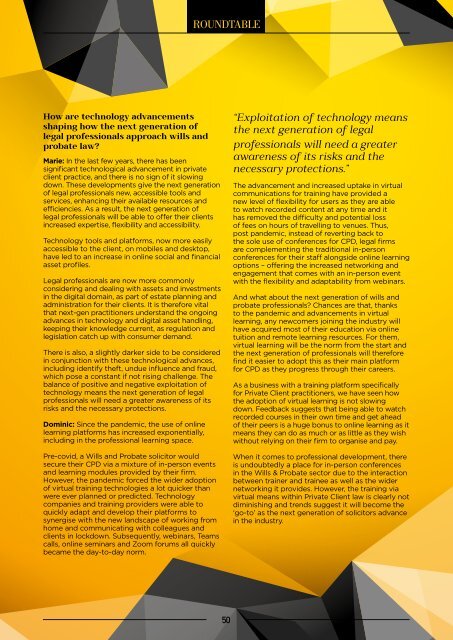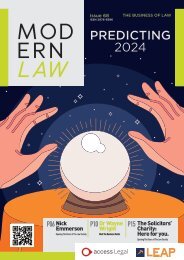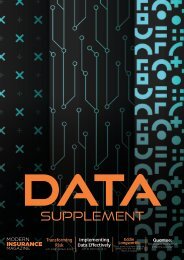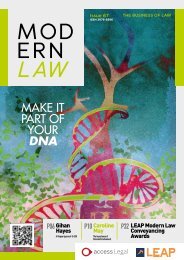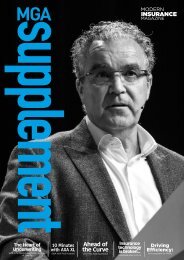Modern Law Magazine Issue 66
Create successful ePaper yourself
Turn your PDF publications into a flip-book with our unique Google optimized e-Paper software.
ROUNDTABLE<br />
ROUNDTABLE<br />
How are technology advancements<br />
shaping how the next generation of<br />
legal professionals approach wills and<br />
probate law?<br />
Marie: In the last few years, there has been<br />
significant technological advancement in private<br />
client practice, and there is no sign of it slowing<br />
down. These developments give the next generation<br />
of legal professionals new, accessible tools and<br />
services, enhancing their available resources and<br />
efficiencies. As a result, the next generation of<br />
legal professionals will be able to offer their clients<br />
increased expertise, flexibility and accessibility.<br />
Technology tools and platforms, now more easily<br />
accessible to the client, on mobiles and desktop,<br />
have led to an increase in online social and financial<br />
asset profiles.<br />
Legal professionals are now more commonly<br />
considering and dealing with assets and investments<br />
in the digital domain, as part of estate planning and<br />
administration for their clients. It is therefore vital<br />
that next-gen practitioners understand the ongoing<br />
advances in technology and digital asset handling,<br />
keeping their knowledge current, as regulation and<br />
legislation catch up with consumer demand.<br />
There is also, a slightly darker side to be considered<br />
in conjunction with these technological advances,<br />
including identify theft, undue influence and fraud,<br />
which pose a constant if not rising challenge. The<br />
balance of positive and negative exploitation of<br />
technology means the next generation of legal<br />
professionals will need a greater awareness of its<br />
risks and the necessary protections.<br />
Dominic: Since the pandemic, the use of online<br />
learning platforms has increased exponentially,<br />
including in the professional learning space.<br />
Pre-covid, a Wills and Probate solicitor would<br />
secure their CPD via a mixture of in-person events<br />
and learning modules provided by their firm.<br />
However, the pandemic forced the wider adoption<br />
of virtual training technologies a lot quicker than<br />
were ever planned or predicted. Technology<br />
companies and training providers were able to<br />
quickly adapt and develop their platforms to<br />
synergise with the new landscape of working from<br />
home and communicating with colleagues and<br />
clients in lockdown. Subsequently, webinars, Teams<br />
calls, online seminars and Zoom forums all quickly<br />
became the day-to-day norm.<br />
“Exploitation of technology means<br />
the next generation of legal<br />
professionals will need a greater<br />
awareness of its risks and the<br />
necessary protections.”<br />
The advancement and increased uptake in virtual<br />
communications for training have provided a<br />
new level of flexibility for users as they are able<br />
to watch recorded content at any time and it<br />
has removed the difficulty and potential loss<br />
of fees on hours of travelling to venues. Thus,<br />
post pandemic, instead of reverting back to<br />
the sole use of conferences for CPD, legal firms<br />
are complementing the traditional in-person<br />
conferences for their staff alongside online learning<br />
options – offering the increased networking and<br />
engagement that comes with an in-person event<br />
with the flexibility and adaptability from webinars.<br />
And what about the next generation of wills and<br />
probate professionals? Chances are that, thanks<br />
to the pandemic and advancements in virtual<br />
learning, any newcomers joining the industry will<br />
have acquired most of their education via online<br />
tuition and remote learning resources. For them,<br />
virtual learning will be the norm from the start and<br />
the next generation of professionals will therefore<br />
find it easier to adopt this as their main platform<br />
for CPD as they progress through their careers.<br />
As a business with a training platform specifically<br />
for Private Client practitioners, we have seen how<br />
the adoption of virtual learning is not slowing<br />
down. Feedback suggests that being able to watch<br />
recorded courses in their own time and get ahead<br />
of their peers is a huge bonus to online learning as it<br />
means they can do as much or as little as they wish<br />
without relying on their firm to organise and pay.<br />
When it comes to professional development, there<br />
is undoubtedly a place for in-person conferences<br />
in the Wills & Probate sector due to the interaction<br />
between trainer and trainee as well as the wider<br />
networking it provides. However, the training via<br />
virtual means within Private Client law is clearly not<br />
diminishing and trends suggest it will become the<br />
‘go-to’ as the next generation of solicitors advance<br />
in the industry.<br />
As the legal landscape evolves, what<br />
skills beyond traditional legal knowledge<br />
are becoming essential for success in the<br />
modern wills and probate sector?<br />
Dominic: <strong>Law</strong>yers know the law. At Estate<br />
Research we are genealogists and know<br />
genealogical research. We are regularly asked by<br />
members of the public to offer legal advice or<br />
comment on how a law applies to their situation.<br />
Our answer is always the same; speak to an<br />
expert, speak to a lawyer.<br />
In the course of administering an estate solicitors<br />
will need to deal with many things that are outside<br />
of their expertise and may be outside of their<br />
indemnity. This can be anything from having to<br />
sell or transfer a property overseas, to clearing<br />
an empty property, to correctly identifying all<br />
beneficiaries entitled under a Will or under the<br />
rules of intestacy. Regardless of the challenge,<br />
solicitors would always be best knowing where to<br />
turn to consult an expert in that field.<br />
We have seen numerous cases where solicitors<br />
have tried to deal with matters themselves leading<br />
to problems. We have seen cases where empty<br />
properties were not properly insured and so the<br />
estate was devalued after vandals caused damage<br />
to the property ,we have seen solicitors have to<br />
write off fees as they did not check adequately if<br />
there was a Will and we have seen far too many<br />
cases where solicitors have not correctly located<br />
beneficiaries to estates prior to distribution.<br />
Practitioners should always ask themselves:<br />
· Am I the expert in this?<br />
· Am I insured to undertake this task?<br />
If the answer to either is no, or they have any<br />
doubts, speak to an expert in that field.<br />
“It has never been more of a<br />
challenge to work out who<br />
should be entitled to an estate.”<br />
“Constructively sharing positive<br />
and negative practice experiences<br />
with the next generation of legal<br />
professionals is extremely valuable.”<br />
Marie: Many private client practitioners may agree<br />
that providing excellent client service has always<br />
required an extensive and varied skill set – not just<br />
traditional legal skills. As clients negotiate significant<br />
financial, technological and socio-economic<br />
changes, practitioners may wish to enhance their<br />
skills and grow their technical knowledge, taking<br />
advantage of the new and emerging efficiencies<br />
available to them and their clients.<br />
Collaborative skills have always been necessary, but<br />
as continuing process delays affect the profession,<br />
centralised and increasingly connected software<br />
brings new value. It can increase an organisation’s<br />
visibility and accessibility, so enabling it to<br />
maximise progress by working collaboratively<br />
across internal teams and external stakeholders.<br />
Mentorship and knowledge transfer<br />
are crucial for preserving the wisdom<br />
of experienced practitioners. How can<br />
seasoned professionals’ best mentor and<br />
guide the next generation of lawyers<br />
entering the wills and probate field?<br />
Marie: Constructively sharing positive and<br />
negative practice experiences with the next<br />
generation of legal professionals is extremely<br />
valuable. Creating and developing honest and<br />
open environments, in which experienced and<br />
new legal professionals can share experiences and<br />
discussions, will encourage and spark progress<br />
across the profession. These environments inspire<br />
innovative ideas and build confidence.<br />
New perspectives are constructive, and knowledge<br />
transfer can run in both directions, no matter the<br />
level of experience.<br />
50 51


